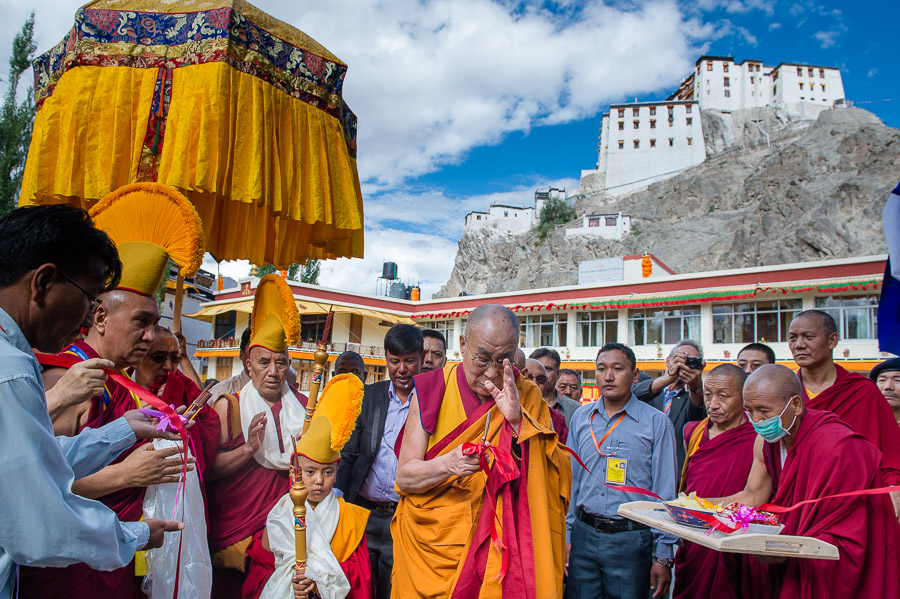
(TibetanReview.net, Jul30, 2015) – Visiting the Ladakh region of India’s Jammu & Kashmir state for five days from Jul 27, mainly at the invitation of Spituk Monastery to attend their summer Perfection of Wisdom debates, the Dalai Lama on Jul 28 morning took time off to visit the Jokhang temple, greeted by throngs of people along the streets. He then addressed thousands of people, mainly students from schools across the Leh region, at the Jamyang School he had helped to set up.
At the Jokhang Temple he was joined by the Ganden Tripa Rizong Rinpoche and other lamas as well as officials of the Ladakh Autonomous Hill Council administration. He joined them in prayers and then spoke briefly. He said that while it would be good to recite the collections of Kagyur and Tengyur volumes, which embody the corpus of Tibetan Buddhist texts, from time to time, one should also study them. “The Buddha’s teachings are an account of his experience. They reveal his great qualities. You people of Ladakh, laypeople and monastics, should study what the Buddha taught.”
Arriving at the Jamyang School thereafter, the Dalai Lama inaugurated a new girls’ hostel and later spoke on the ongoing dialogue between Buddhist science and modern science as requested. He began by saying all religious traditions had religious, philosophical and cultural aspects; that they differed in their philosophical and cultural aspects. He added, however, that in the religious aspects, all faiths had shared values in terms that included the practice of love, compassion, tolerance and so on.
He continued that while the different faiths differed in their philosophical approaches, their purpose was the same: supporting the practice of love and compassion. “The main message of religion is peace. All religions tell us to be good human beings,” he added.
He also said that prayers alone were not enough but must be supported by actions on the basis of the understanding of “the oneness of our human family”.
Coming then to the topic of Buddhist science and modern science, the Dalai Lama said it was the profound exploration of the mind that originally took place in India that Buddhist science brings to the conversation with modern science.
He referred to the famed Indian space scientist Raja Ramana’s observation that Nagarjuna’s writings deal with ideas echoed today in quantum physics, indicating that a dialogue between Buddhist science and modern science can be mutually beneficial. In particle physics, he noted, while the Abhidharma contained rudimentary explanations of atoms, these had been thoroughly investigated by modern science.
The Dalai Lama also answered questions from the audience. Asked whether the Buddha or his teachings came first, the Dalai Lama remarked that the continuity of mind, whose nature is clarity and awareness, had neither beginning nor end. “Buddhism asserts different levels of consciousness of which consciousness of the waking state is the coarsest, that of the dream state is subtler, and that of deep sleep is yet more subtle. The subtlest level of consciousness dawns at the time of death. There are cases that have attracted the interest of modern science of people whose bodies remain fresh for from days to weeks after their apparent clinical death. The Buddhist explanation is that the subtlest consciousness and its accompanying subtle energy remain present. Research and investigations of the phenomenon continue.”
Answering another question, he said: “The Buddha taught according to his own experience. A 21st century Buddhist understands that the Buddha’s teaching has nothing to do with faith, rituals and blessings.”


